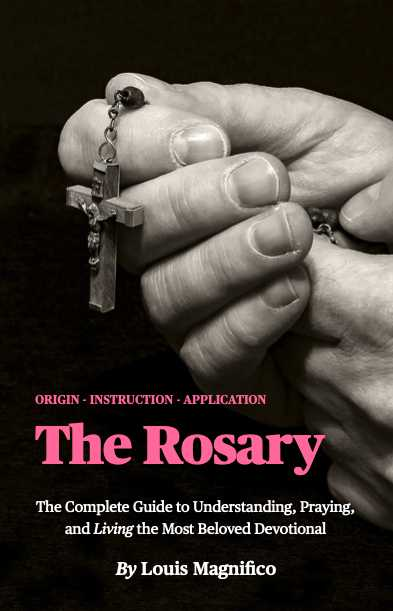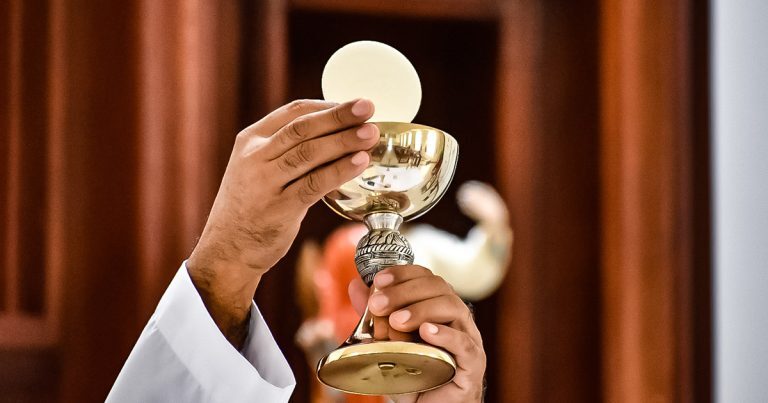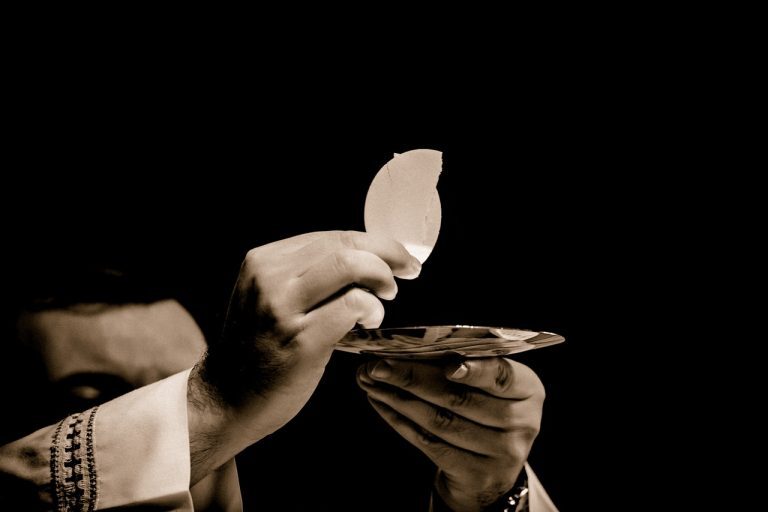I didn’t grow up in a religious family by any stretch of the imagination. Being Italian, however, I was baptized a Catholic as an infant. My point of entry in this world was Memphis, TN – the birthplace of rock and roll. For reasons I don’t think I’ll ever know, my non-religious family sent me to Catholic school for grades 1-6, and that is where I fell in love with the faith. I knew God was real, I loved the beautiful imagery of the Church, and I felt reverence toward God from the faithful whenever I attended weekday mass during school (my family did not go to church so weekday masses at school was my only exposure). I can honestly say that I felt very close to God – even at such a young age.
Unfortunately, as I grew up, I grew apart. By junior high, I put anything and everything else in front of and in place of God. I enjoyed life. I was never a “bad seed” as some people may refer to troubled youth. I was fairly constructive as a teenager. I am living proof that sometimes, people’s stories of straying from God don’t always involve years of drug abuse or living as a prostitute… sometimes, it is the seemingly innocuous things of life that just simply take first place and therefore push God further away. I was (and still am now) a rock musician and a writer. Performing music became the central focus of my life. And as any child of the 70s and 80s will tell you, playing in a rock band got the attention of girls in those days. So I was enjoying life, having fun, spending time with friends, and playing in a band… one thing led to another and, as I said, before long I put anything and everything in front of and in place of God. To use a dating expression, “it’s not you, it’s me,” is what I suppose I said to God. “We’re just drifting apart.”
But in my later teenage years, something happened. I’d always enjoyed horror movies ever since my youth. As an older teenager, this passion became an obsession. I also avidly began reading horror fiction at this time. To state upfront, I do not necessarily have a problem with some of this genre (if it is your thing)… and I still enjoy some of it to this day. But for me, at that time, it led me down a very dark spiral. I began obsessing not just with fiction and film… but with the very real “dark side.” With Satan. Before long, innocent “creature features” and Twilight Zone episodes weren’t enough to satisfy me. Instead, I obtained a copy of Anton Lavey’s The Satanic Bible and researched occult practices. Not that I ever participated in any of these practices… but I was fascinated by them and drawn to them. “Enchanting” would be a good description of how I felt about the dark side. I eventually wrote, produced, and directed a motion picture that in many ways was an ode to evil. I was only 18-20 years of age when producing this film. Fortunately for me, I enjoyed music more than film and since filmmaking takes an incredible amount of time and energy out of one’s life, I went back to music as my main focus. I fear that had I not, the dark side would have drawn me in further.
It was also during this time in my life that I felt something missing. I always believed in God, but I knew I had replaced him with everything else in an attempt to satisfy me and bring me peace, joy, and fulfillment. Not far from my house in those days, a rock n roll style church had opened with a modern and “fun” worship style. I knew what was missing in my life: God. I went to this church, began playing in the church band, and became a Protestant.
For thirty years, I dug deep into faith and became very active in church. For a two year period, I served as a deacon (although that’s a very different role in the Evangelical Presbyterian church from the role of the same name in the Catholic Church). I launched a tape kiosk where we recorded sermons live at each service and made them instantly available on cassette tape for church goers who wanted to give the sermon another listen or pass the tape to a friend. And, of course, I continued playing in the church band – both in the regular contemporary services as well as in a “hard rock” service that was held at night. Outside of the church hour, I became intrigued by the topic of Christian apologetics. I had sincere and thought-provoking theological questions, I always asked the “difficult questions,” and I always felt I needed to find the answers for them. I never doubted God… but I knew there were “challenging” questions about the Christian faith and I dug in to these matters with a feverish zeal. I read books by Christian apologists such as Walter Martin and Hank Hanegraaff as well as theologians such as RC Sproul. I also enrolled in several seminary classes that I used as college electives.
Sounds like a great time, doesn’t it? Not hardly… Over these 30 years as a Protestant, my life was presented with several exceedingly difficult challenges. We won’t dive into them here – maybe some other time. But let’s just say they were so extreme you could make a movie about it. A horror movie. Or at least an intense and sad drama. Throughout this time, it was my relationship with God that pulled me through. And the closer I walked with God, the more intense was my zeal for gaining answers to the tough questions about theology.
But I have to admit two things.
1) I always – especially during those times of trouble and turmoil in my life – missed the reverence I saw in the Catholic faith. I missed how seriously people took their God. He wasn’t their “co-pilot” – he was their King. Their Lord. Their God. This is not to say that I didn’t have the privilege of knowing several deeply committed Christians during my time as a Protestant. But I just felt that Protestant “worship” didn’t feel like the worship I was introduced to in my early years as a Catholic. In my hardest times during those 30 years, I’d find myself driving to the Catholic Church where I attended elementary school. It would be empty, as I’d go when it was not mass time. I’d open the doors, dip my finger into the Holy Water basin and make the Sign of the Cross. I’d walk the Stations of the Cross along the side walls of the church then I’d kneel in front of the alter, cry my eyes out, and pray. The Catholic Church “experience” felt simply closer to being in God’s presence and I desperately needed Him in those moments (and always). I’d leave these experiences and continue to attend weekend services at the modern Rock n Roll mega-church. But I’d always find myself returning to that Catholic church, alone, when the walls were caving in around me…
2) As I said, I had deep questions regarding the faith. And to be honest, I was never fully satisfied with the answers given to me from Protestant theologians, apologists, professors, and pastors. It didn’t matter whether they were liberal theologians or conservative ones, they never fully answered my questions to my satisfaction. They seemed to always be “cherry picking” verses to fit their theology. Often times over my 30 years as a Protestant, I’d go to someone I truly respected – someone I felt would “have all the answers” – and they’d leave me with more questions than answers, more confused than before. Again, I never doubted God – but I had theological questions that needed explanations. And I never got explanations to these questions that weren’t full of holes. That is, not until I sought out answers from Catholic sources. What led to this?
My wife and I had an opportunity to relocate to Florida in 2021 and our life was in a very peaceful, beautiful place – things were really “going smooth,” as they say. Translation: time for a shake up. But this shake up would be good! Very good!
In such a peaceful place and time, and now that the kids were all raised, I had time to return to my thoughts. Life had slowed down enough to listen, to think, to ponder, to meditate… I began studying the Bible again and reading through some of those difficult passages that led to so many questions. I decided to look for answers from “different sources.” Catholic sources.
And the answers came. Like a floodgate opened, they came rolling in. Fast and furious, one by one, all of my questions were answered with clarity. No holes left in the theological arguments anymore. And, in spite of this, there were still some questions – few, but still some – for which the Catholic answer was simply this: “it is a mystery of God.” Think of the beauty of that, for a moment:
Faith doesn’t have to exclude mystery.
As I devoured one Catholic book after another to better understand the faith that I had left behind so many years before, I realized I wasn’t just “finally getting answers to my questions” – I was inevitably returning to Catholicism. I was returning home.
In 2024, I reaffirmed my faith as a Catholic. I met a priest for confession and began attending mass again. After many conversations with my wife during this period (that story is for another time), she also began RCIA (OCIA) classes to enter the Church. As did our youngest daughter.
And now the Journey continues…
















